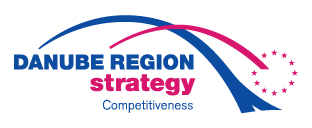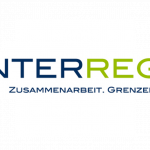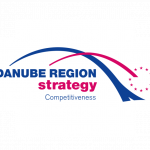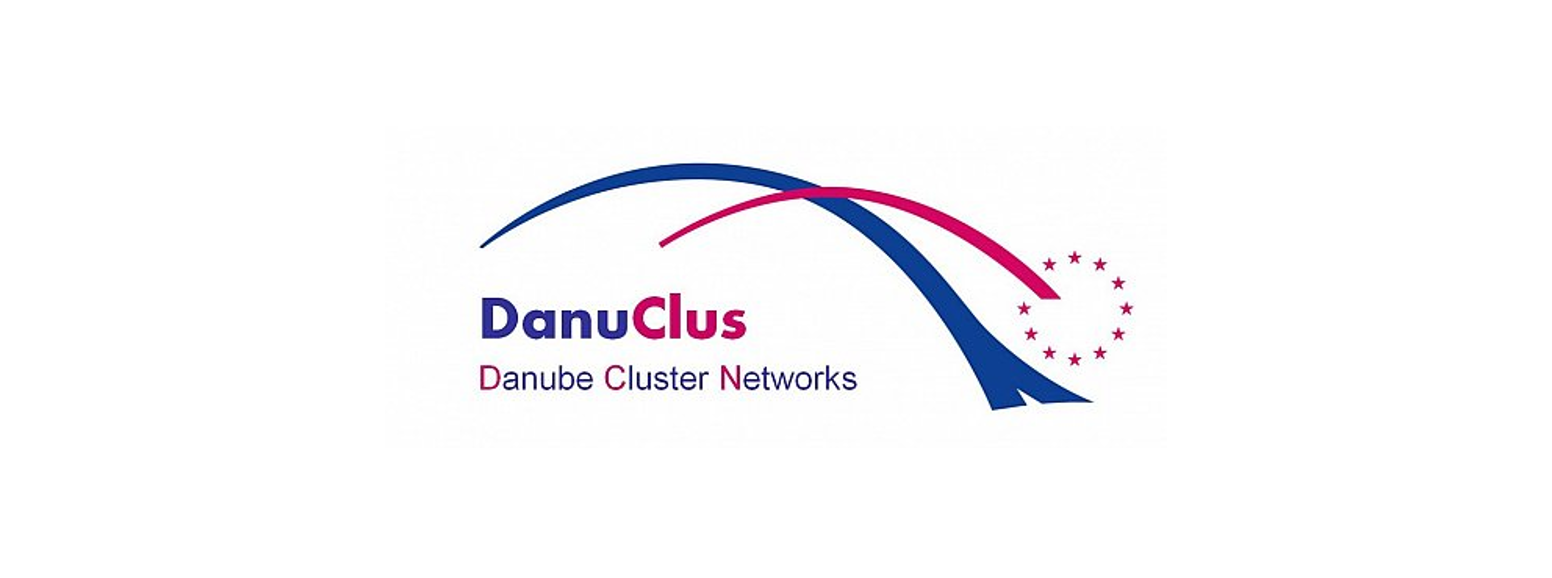The third political-strategic meeting of the Working Group Clusters of Excellence took place on 30 April 2014 in Vienna. A record number of 51 cluster experts, cluster managers and governmental representatives from 9 Danube Region countries (AT, BA, BG, CZ, DE, HU, RO, RS, SK) came together in order to jointly develop cooperation projects during a whole day of intensive discussions and workshops.
140430_Minutes_WG_CoE_Vienna.pdf
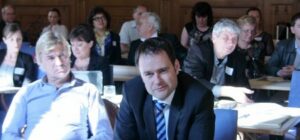
Overview:
Introductory Session:
The meeting started with a warm welcome by the host, Helmut Miernicki(CEO of ecoplus, AT), who presented information on the region of Lower Austria’s activities in the Danube Region.
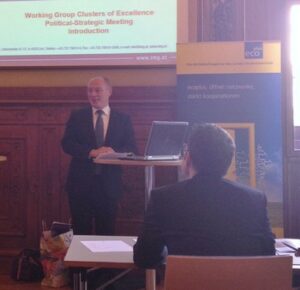
Subsequently, Sigrid Winkler (TMG Upper Austria, ) as leader of the Working Group Clusters of Excellence took over with a short outline of the goals of the meeting: developing project ideas, finding potential project partners, identifying funding opportunities. As background information she presented the state of programming in the European Territorial Cooperation (ETC) Danube Programme. Especially the thematic objectives “Research & Innovation” as well as “Governance” have potential to become funding sources for cluster projects. First calls in the programme are expected in late spring or early summer 2015.
140430_Winkler_WG_Cluster_Intro_ppt.pdf
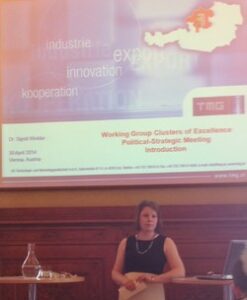
Gabor Hunya (wiiw) presented an overview on the cluster chapter of the socio-economic study for the Danube Region prepared for Priority Area 8. He invited the participants of the meeting to send him feedback on the current draft of the study ().
EUSDR socio-economic study.pdf
Six Workshops:
During the day, the participants split up into 6 groups in order to discuss and develop project ideas relevant for their field of expertise. These six workshops were initiated and held by members of the working group. The topics of the workshops reflected strong fields of cluster activity in the Danube Region, the general economic activity of this geographic area as well as future challenges for clusters and Europe as a whole.
Six workshop topics:
- Smart Furniture Manufacturing
- Innovation and Gender/Diversity
- Connecting Manufacturing Industries (esp. automotive)
- Biomass: Green Chemistry Belt®
- Cluster Optimization
- Creative industries
For detailed information on the outcomes of the workshops see below!
Concluding Session:
Sigrid Winkler reported that Technical Assistance Facility for Danube Region Projects (TAF-DRP) had started in April 2014.
140430_Winkler_WG_Clusters_Conclusions_ppt.pdf
Then the workshop leaders presented the results of all six workshops to the plenum for further discussion.
It was decided to convene a follow-up meeting with the workshop leaders and persons responsible for EU funding programmes to discuss the feasibility of the proposed project ideas in the new EU funding period. The meeting was scheduled to take place at the fringes of the EUSDR Annual Forum by the end of June 2014 in Vienna (more information to follow soon).
Finally, the day ended with a networking dinner in a social atmosphere over Vienna Schnitzel and spirited discussions.
Next Steps:
- 26 June 2014: Follow-up Meeting WG Clusters: Workshop leaders and EU funding programmes (tbc)
- 27 June 2014, 12:30-13:00, Vienna City Hall: EUSDR Annual Forum 2014: Danube Cosmos on “DanuClus – Progress and Future of the Danube Cluster Networks”
- Until October 2014: Technical Assistance Facility for DanuClus
Results of the Workshops:
Workshop 1: Smart Furniture Manufacturing
Workshop leader: Genoveva Christova (Bulgarian Furniture Cluster, BG,)
Facilitator: John Murray (GrowthClusters Ltd., BG,)

Furniture manufacturing in the Danube Region has a potential for cross-cluster innovation by integrating for instance healthcare or green technology clusters. The workshop with 14 participants representing nine Danube Region countries produced the following key conclusions:
- “Passport for Furniture” and ID-Cards – collaboration with ICT
- Active Ageing
- Container ships on the Danube to transfer used furniture to workshops for re-manufacturing – logistics project
- Improved design technology for better use of materials
- Eco-friendly restaurants as a market for “green furniture”
- Furniture leasing companies as a market for re-manufacturing
- Funding Opportunities in DG Enterprise’s “Competitive Public Procurement Practice” for the promotion of re-used furniture in public buildings
- Need for “applied” experts in furniture costumization
- Competence mapping and pilot actions in these areas
- Liaison with similar EU thematic organizations/projects
More information:
140430_WS_Furniture_Manufacturing.pdf
140430_Christova_Furniture_ppt.pdf
Workshop 2: Gender/Diversity and Innovation
Workshop leaders: Lucia Seel (Lucia Seel Consulting, AT, ) and Gisa Schosswohl (INTO projects, AT, )
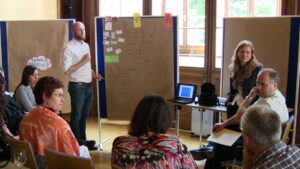
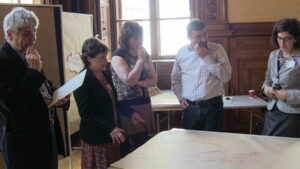
As one of the most visited workshops of the day, it addressed the question how cluster initiatives can contribute to generating more innovation for their industries by taking into consideration a gender/diversity approach. Two concrete project ideas were developed:
- Diversity management guidelines:
- Development of guidelines for companies to support their implementation of diversity management systems, with pilot actions in a testing phase
- Gender and diversity in innovation through clusters:
- Create awareness for women’s innovation potential for more/better business: women as producers and consumers (market analysis), policy level
- Strengthening female entrepreneurship (education and training)
More information:
140430_WS_Gender_Diversity_and_Innovation.pdf
140430_Schosswohl_Seel_Gender_ppt.pdf
Workshop 3: Connecting Manufacturing Industries
Workshop leader: Till Truckenmüller (Automotive Cluster Bulgaria, BG, )
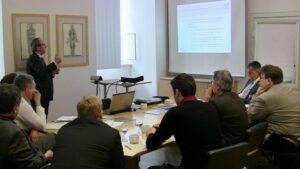
With ten participants from six countries, this workshop focused on automotive clusters when discussing several potential projects and actions:
- Installing a spokesperson for (automotive) clusters in Brussels
- Research project on products/components potentially produced in Danube Region to substitute imports from China etc.
- Supply chain development for SMEs in the automotive sector
- Multiplication of the German dual education system in other Danube countries
- Cross-collaboration of automotive industry and other relevant sectors (e.g. technical textiles, plastics, aluminum etc.)
- Quality sign for clusters
- Managed online platform for technology-driven clusters, integration of existing platforms
- Project “DonauMotor” (in collaboration with LP – Fraunhofer Institute, DE): Open for more clusters, especially supercluster platform (see above)
More information:
140430_WS_Connecting_Manufacturing_Industries.pdf
140430_Truckenmüller_Automotive_ppt
Workshop 4: Biomass: Green Chemistry Belt®
Workshop leader: Claudia Kirchmair (Biocampus Straubing, DE, )
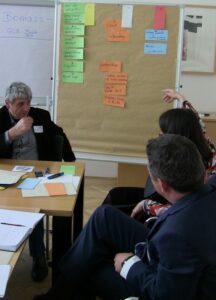
Unfortunately the workshop leader, Claudia Kirchmair from Biocampus Straubing, could not attend the workshop due to illness. Nevertheless, eight potential project partners representing five Danube Region countries discussed their ideas and their willingness to take on a role in this already fairly developed project:
- The project Green Chemistry Belt should be an instrument to develop a roadmap for green chemistry in the Danube Region: potential for biomass, infrastructure for refinery and logistics, supply chains etc.
- Awareness raising among policy makers about the importance of green chemistry for future economic development in Europe: less oil dependency, employment opportunities, technology development, eco-friendliness etc.
- Build-up of a transnational network of potentially interested partners for further project development
More information:
Workshop 5: Cluster Optimization
Workshop leader: Pavla Bruskova (National Cluster Association, CZ, )
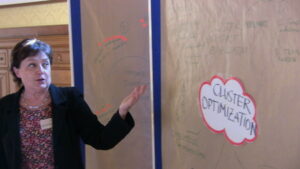
Cluster optimization is an important issue for many clusters in the Danube Region, where clusters often still have potential for further development. Therefore this workshop attracted most participants. Cluster performance and impact evaluation was a main point of discussion. After a presentation by Prof. Peter Heydebreck (inno AG, DE) on learnings from the EU-funded project ClusterCOOP, the group developed three work packages for a project on cluster performance and impact evaluation:
- Monitoring: performance indicators and analysis of data on the activities of cluster organizations and its members, as well as cluster policy impacts and thus public funding efficiency
- Evaluation: basis for an “Integrated National Cluster Accreditation Scheme” to review cluster (policy) objectives and cluster governance
- Justification: awareness raising and capacity building of National Cluster Associations, cluster management training etc.
More information:
140430_WS_Cluster_Optimization.pdf
140430_Heydebreck_Cluster_Optimization_ppt.pdf
Workshop 6: Creative and Cultural Industries
Workshop leader: Lucia Seel (Lucia Seel Consulting, AT, )
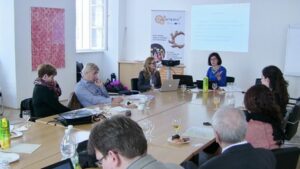
The actual state of play in the creative and cultural industries (CCI) in the Danube Region is still a big unknown: who are the actors, are there any clusters, how to cope with the diversity of this sector, how does CCI benefit the innovation potential? On the basis of these questions, the participants of this workshop developed a number of actions:
- Mapping exercise
- Building up networks and platforms, for instance LinkedIn Group “CREATIVE DANUBE” (already open!) and synergies with EUSDR PA 9
- Awareness raising about the potential of CCI for the innovation process
- Link between CCI and city development
- Potential projects
- Linking river cities (second biggest cities after capitals) in creativity networks
- Floating exhibitions and residency programmes: linking creativity-driven organizations and industries
- Integration of CCI actors into project “Danubius” (RO and DE)
More information:
140430_WS_Creative_Industries.pdf
